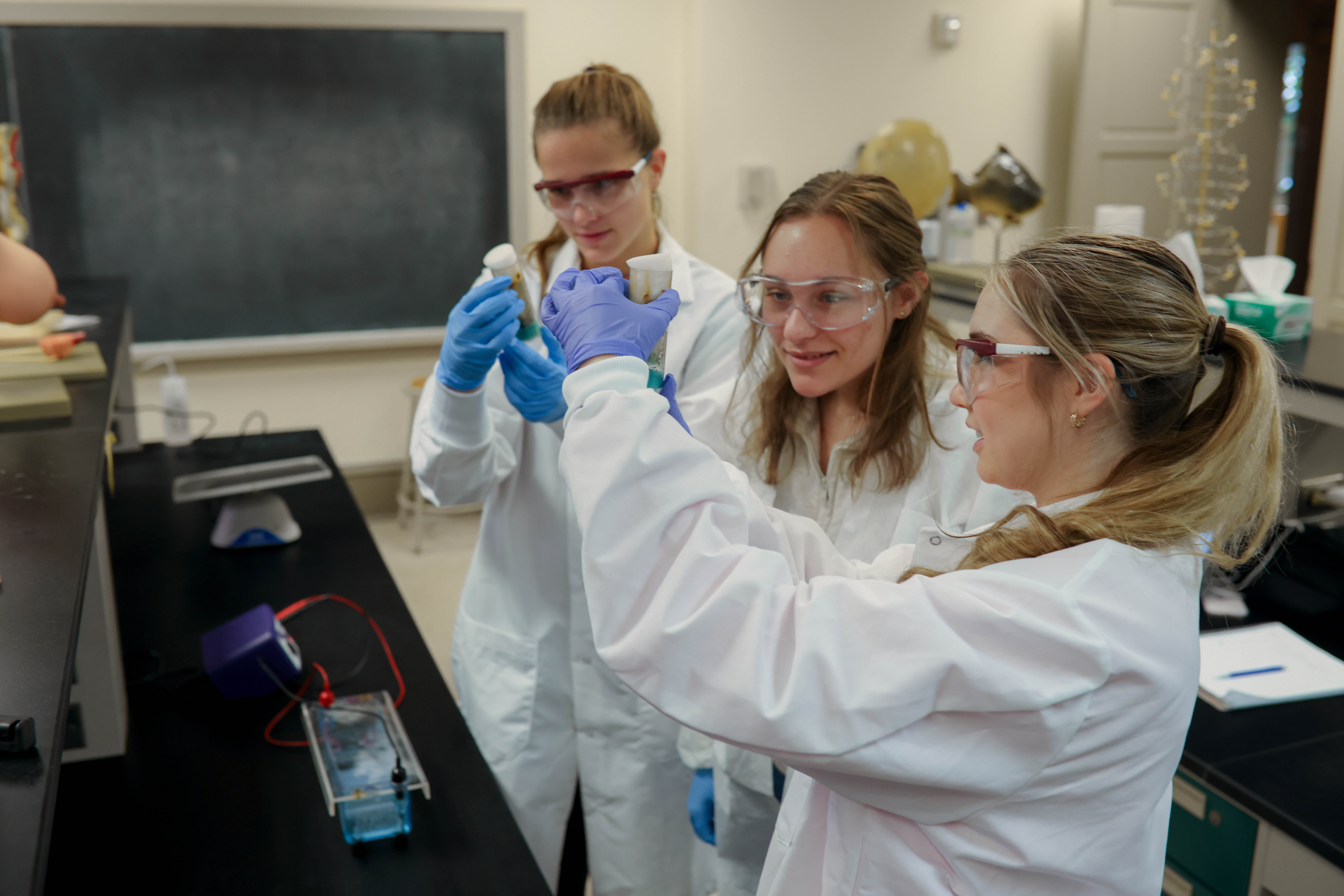Physics
<RETURN TO ALL PROGRAMS
Physics Overview & Goals
The program in Physical Science, with the option for Pre-Engineering, strives to introduce students to the rich body of knowledge expressing the physicist’s concept of the universe and its physical laws. Integrated into the program is a 3-2 dual degree engineering track. In this program, a student completes three years at Bethany and two years at our affiliated engineering school, Case Western Reserve University. Students completing this dual degree will graduate with a Bachelor of Science degree in Physical Science and a Bachelor of Engineering degree from CWRU in five years.
Bethanians study physics, chemistry, computer science, mathematics, economics, and the humanities, as well as choose an engineering focus, such as aerospace, biomedical, chemical, civil, computer, electrical, materials science, mechanical, polymer, or systems control. Alternatively, engineers can opt to remain at Bethany to complete a bachelor’s degree and apply to any engineering school for a master’s degree. Often, Bethany students choosing this route double major in order to supplement their graduate plans.

Areas Of Study
Pre-Engineering (Pre-Professional)
ALUMNISUCCESS
CAREERS IN PHYSICS
- Aerospace
- Architectural
- Chemical
- Civil
- Electrical
- Environmental
- Mechanical
- Nuclear
- Petroleum
- Astronomy
- Plasma
- Nuclear
- High-energy particle
- Solid state
- Corporate
- Academic
- Government
Teaching
- Secondary
- Post-Secondary
Meet The Faculty
Requirements
EXPERIMENTAL PHYSICS MINOR
Experimental Physics: PHYS 201, 202, 222, 300, 318.
THEORETICAL PHYSICS MINOR
PHYS 201, 202, and three additional courses selected from PHYS 251, 261, 300, 302, and 304.
PRE-ENGINEERING, PRE-PROFESSIONAL PROGRAM
All students are required to take a minimum of 36 credits within the department: CHEM 101, 102, PHYS 201, 202, 222, 241, 300, 490, either CHEM 385, 386 or PHYS 318, and CHEM 490 or PHYS 490. In addition, at least 6 credits from CHEM 211, 212, 285, 320; CPSC/MATH 210; CPSC 152, 275; MATH 354; PHYS 251, 261, 301, 302, 303. Also required are MATH 201, 202, 203, 341, and CPSC 151. ECON 162 is strongly recommended.
A Combined Three-Two plan with Case Western Reserve University is available to students interested in various engineering or industrial management degrees.
As each specific engineering program has other course requirements the student will need to consult closely with the pre-engineering advisor about other course selections. A minimum overall and pre-engineering GPA of 3.30 is required to permit Bethany College students to transfer to the engineering school once requirements are met and students are accepted. No guarantee of acceptance is implied by the relationship.
Course Descriptions
PHYSICS
PHYS 100 Physics of Sports 4 credits
This course is an introduction to the fundamental concepts, laws, and theories of physics as they relate to a variety of sports. At the end of the course, students relate these concepts to their sports activities.
PHYS 103 Everyday Physics 4 credits
Everyday Physics is a study from non-technical and non-mathematical viewpoints of the aims, methods (experimental and theoretical), and achievements in the attempts to understand the basic principles governing the physical world. The course begins with commonplace observations and concrete examples and then proceeds to generalizations and hypotheses which unify them. This course is designed for non-science majors. The course includes three hours of lecture and two hours of laboratory each week. (This course may be taken for credit as GENS 103.)
PHYS 151 Astronomy 4 credits
This course is designed to introduce the non-science major to the field of astronomy. Topics include the history of astronomy, light and spectra, the solar system, stars and stellar evolution, galaxies, and the past and future history of the universe. Although the course is primarily descriptive, physical principles underlying astronomical phenomena are studied. The course includes three hours of lecture and two hours of laboratory each week. Laboratories include evening observation sessions and a field trip. An additional course fee is required. (This course may be taken for credit as GENS 151.)
PHYS 201-202 General Physics I & II 4 credits each
General Physics is a two-semester introduction to classical physics for science majors. The first semester focuses on classical mechanics, including kinematics and dynamics in two and three dimensions, momentum, energy, and rotational motion. The second semester covers electricity and magnetism, wave mechanics, and optics. The course includes three hours of lecture and two hours of laboratory each week. Students must have taken or be currently enrolled in MATH 201 or equivalent.
PHYS 222 Electronics 4 credits
The student is presented with the fundamentals of digital and analog circuit analysis. Among topics originally specific to analog circuits are DC circuit analysis using Kirchoff’s laws, mesh equations, transformations, the use of multimeters and oscilloscopes, AC circuit analysis using complex impedances, capacitors, and inductors, resonance, step function analysis, and transitions. Among the topics originally specific to digital analysis are simple logic gates, IC chips, Boolean algebra, adders, flip-flops, shift registers, and counters. After the fundamentals are covered, the emphasis shifts to circuit analysis involving knowledge of both perspectives. This course includes three hours of lecture and two hours of laboratory each week. (This course may be taken for credit as CPSC 222.) Prerequisite: PHYS 201,202 or equivalent or permission of the Chair of the Department.
PHYS 241 Mathematical Methods in the Physical Sciences 3 credits
This course is primarily intended for students with one year of calculus who want to develop, in a short time, a basic competence in each of the many areas of mathematics needed in junior to senior courses in physics and chemistry. Thus, it is intended to be accessible to sophomores (or freshmen with AP calculus from high school). Topics include ordinary and partial differential equations, vector analysis, Fourier series, complex numbers, eigenvalue problems, and orthogonal functions. (This course may be taken for credit as MATH 241.) Prerequisites: MATH 201, 202 or permission of the Instructor.
PHYS 251 Mechanics 3 credits
This course is a study of particle mechanics, central force motions, free oscillations, rotations about an axis, moving coordinates systems, conservation theorems, Lagrange’s equations, and Hamilton’s equations. Prerequisites: PHYS 201-202.
PHYS 261 Electricity and Magnetism 3 credits
Topics in this course include electrostatics, magnetostatics, scalar and vector fields, Poynting’s vector, Laplace’s equation, and boundary value problems. Prerequisites: PHYS 201-202.
PHYS 300 Modern Physics 3 credits
This course uses mathematical and physical reasoning to present the foundations of modern physics. It emphasizes the subjects of special relativity, kinetic theory, atomic theory, and introductory quantum mechanics on the level of the Schrodinger equation. The course is intended for chemistry, mathematics, physics, or pre-engineering majors. Prerequisites: PHYS 201-202 or permission of the Chair of the Department.
PHYS 301 Nonlinear Dynamics and Chaotic Systems 3 credits
This course explores the latest developments in the analysis of nonlinear systems using computer enhanced analysis and novel mathematical approaches to these systems. Emphasis is placed on the special case of nonlinear dynamics known as chaotic systems. Prerequisites: PHYS 201, 202; MATH 201, 202.
PHYS 302 Thermodynamics 3 credits
This course is a study of the physics of thermodynamic systems. Most of the course is devoted to the macroscopic properties of systems, including the first and second laws of thermodynamics, heat, entropy, imposed and natural constraints, equations of state, and applications. Statistical mechanics is briefly introduced to derive the large scale properties of systems from the microscopic behavior of their elements. Prerequisites: PHYS 201-202 or permission of the Chair of the Department.
PHYS 303 Plasma Physics 3 credits
This course examines the properties of plasmas, a collection of charged particles that exhibit collective behavior, and which are much more common than the other phases of matter (solids, liquids, and gases) when the entire known universe is considered, and which are becoming increasingly common in modern technologies. Prerequisites: PHYS 201, 202, 241; MATH 201, 202.
PHYS 304 Optics 3 credits
This course is an introduction to the nature of light and its uses. It begins with a study of geometric optics, including reflection, refraction, lenses and mirrors, and then moves to topics in physical optics, such as interference, diffraction, coherence, and polarization. Prerequisites: PHYS 201-202 or permission of the Chair of the Department.
PHYS 318 Advanced Physics Laboratory 2 credits
This course is designed to build on students’ previous laboratory experience by acquainting them with more advanced experimental equipment and techniques. Students are taught to think like an experimentalist: to analyze and reduce error; to understand statistical inference; to interpret results; to write clear, thorough laboratory reports. Experiments in modern physics, optics, nuclear, and solid state physics are emphasized. Prerequisite: PHYS 300 or permission of the Chair of the Department.
PHYS 401 Introduction to Quantum Mechanics 3 credits
This course is a continuation of the study of classical quantum mechanics begun in PHYS 300. Topics include the three-dimensional Schrodinger equation, selection rules, addition of angular momentum, fine structure in hydrogen, exchange symmetry, the Zeeman effect, and stimulated emission. Prerequisite: PHYS 300 or permission of the Chair of the Department.
PHYS 480 Methods and Materials in Teaching Physical and Life Sciences 3 credits
This course is a study of the aims and methods of teaching the physical and life sciences in the secondary schools. Special attention is given to teaching general laboratory procedures and techniques of teaching. Each of the departments in the physical and life sciences participates in the program. Prerequisite: 16 credits in one of the physical or life sciences or permission of the instructor; EDUC 242; a passing score on PRAXIS I Core Academic Skills for Educators; admission to the teacher education program.
PHYS 487-488 Independent Study 2-4 credits
PHYS 490 Senior Project 2-4 credits
This course offers seniors independent work on research problems in theoretical or experimental physics. Experimental physics projects are offered in such areas as applied optics, electronics, radio astronomy, electron spin resonance, optical fibers, and various solid state subjects: conductivity measurements in semiconductors, charge-coupled devices, GaAs/GaAlAs quantum wells, and others. Theoretical physics projects are unlimited in scope and often involve computer modeling of physical systems. All projects are arranged through consultation with the student’s advisor.
PHYS 495 Comprehensive Exams
This course is an administrative placeholder used to record a student’s score on Comprehensive Exams (CR/NCR).



Info
Visit
Apply
Deposit